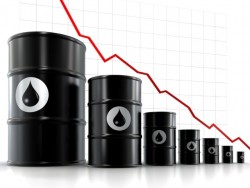تراجع أسعار النفط يدفع دول الخليج نحو التقشف
 شرعت دول الخليج في اجراءات تقشف تشمل الحد من النفقات بهدف مواجهة انخفاض أسعار النفط، مرفقة اياها بخطوات لزيادة مداخيلها غير النفطية وخفض الدعم على المشتقات النفطية، في اجراءات يرى محللون انها، على اهميتها، لا تزال دون المطلوب.
شرعت دول الخليج في اجراءات تقشف تشمل الحد من النفقات بهدف مواجهة انخفاض أسعار النفط، مرفقة اياها بخطوات لزيادة مداخيلها غير النفطية وخفض الدعم على المشتقات النفطية، في اجراءات يرى محللون انها، على اهميتها، لا تزال دون المطلوب.
ومن المتوقع ان تسجل دول مجلس التعاون الخليجي التي تعد من ابرز مصدري النفط في العالم وتعتمد عليه موازناتها بشكل كبير، عجزا يبلغ 180 مليار دولار في 2015، مع ترجيح بان يستمر شح ايرادات النفط اعواما، وذلك بعدما وفرت لها اسعار النفط المرتفعة فائضا في موازاناتها السنوية طوال العقد الفائت.
وتوقعت مديرة صندوق النقد الدولي كريستين لاغارد خلال لقائها مسؤولين من دول المجلس في الدوحة هذا الشهر، ان تبقى اسعار النفط على مستوياتها المتدنية لسنوات، داعية هذه الدول الى اتخاذ اجراءات لمواجهة هذا الواقع وتنويع مصادر دخلها.
وبحسب احصاءات صندوق النقد، تراجع فائض موازنات دول المجلس (السعودية، الامارات، قطر، الكويت، البحرين، وعمان)، من 182 مليار دولار في 2013، الى 24 مليارا فقط في 2014. وسجلت السعودية والبحرين وعمان عجزا في موازنة 2014 للمرة الاولى منذ الازمة المالية العالمية في 2009.
وفقد برميل النفط اكثر من خمسين بالمئة من سعره منذ منتصف 2014، ما قد يحرم دول الخليج مداخيل تقدر ب275 مليار دولار، بحسب صندوق النقد.
– تقليص الدعم والانفاق –
ونصح صندوق النقد دول الخليج التي حققت خلال العقد الماضي فائضا في موازنتها بلغ 2,7 تريليون دولار، باتباع منهج تدريجي لتطبيق الاصلاحات المالية وتنويع مصادر الدخل.
ويرجح صندوق النقد والبنك الدولي ان الكلفة المباشرة لدعم اسعار الطاقة في دول مجلس التعاون الخليجي بلغت ستين مليار دولار العام الماضي. وترتفع هذه الكلفة الى 175 مليارا في حال اضيفت اليها تكاليف اخرى مرتبطة بالبيئة والبنى التحتية والاستهلاك.
وبادرت الامارات الى تطبيق خطوات اصلاحية في حزيران/يونيو، عبر تحرير اسعار الوقود ورفع تعرفة الكهرباء في ابو ظبي، في ما يتوقع ان يوفر مئات مليارات الدولارات.
كما خصصت الامارات التي يعد اقتصادها الاكثر تنوعا لجهة مصادر الدخل بين الدول الخليجية، ثمانين مليار دولار لمشاريع غير مرتبطة بالنفط.
اما الكويت فبدأت ببيع بعض مشتقات النفط باسعار السوق منذ مطلع 2015. وخفضت الانفاق بنسبة 17 بالمئة، وهي في طور زيادة اسعار الوقود وسعر المياه والكهرباء.
وتبحث السعودية في إرجاء المشاريع “غير الضرورية” ودراسة اصلاحات في مجال دعم اسعار مواد الطاقة. ويعد سعر الوقود في المملكة من الادنى عالميا.
اما قطر الغنية بالغاز، وعمان والبحرين، فأعلنت انها في طور دراسة اجراءات لتقليص الانفاق وخفض الدعم.
ويبلغ انتاج هذه الدول التي يقيم فيها قرابة خمسين مليون شخص نصفهم من الاجانب، نحو 18 مليون برميل من النفط يوميا. وكان انفاق هذه الدول بلغ بين 2008 و2013 قرابة 550 مليار دولار سنويا، بحسب صندوق النقد.
وفي دول يشكل النفط ابرز مداخيلها، بات سعر البرميل المطلوب لتأمين التوازن بين الايرادات والنفقات، 106 دولارات بالنسبة الى السعودية مثلا، بينما كان السعر المطلوب قبل اعوام سبعين دولارا. علما ان السعر الحالي للبرميل هو دون الخمسين دولارا.
– تدابير غير سهلة وغير كافية –
ورغم ان الاجراءات لا تزال في مراحلها الاولى، يرى محللون ان تطبيقها لن يكون سهلا في دول اعتادت توفير الرعاية الاجتماعية، مؤكدين ضرورة ان تكون اعمق واكثر استدامة.
ويقول رئيس البحث الاقتصادي في مركز الكويت المالي (مركز) ام. ار. راغو لوكالة فرانس برس “حجم المشكلة اكبر هذه المرة لان الاعانات المالية (الدعم) والاجور زادت بشكل هائل في الاعوام الماضية، وتشكل حاليا تسعين بالمئة من الانفاق الحكومي”.
ويضيف “لا يمكنهم التراجع عن الاجور لان الموضوع دقيق جدا”.
ويعتبر كبير اقتصاديي البنك الدولي للشرق الاوسط وشمال افريقيا شانتا ديفارايان ان “هذه فقط البداية. الخطوات يجب ان تركز على الاصلاحات والبطالة والتنويع”.
يضيف “ثمة حاجة الى خطوات كثيرة”.
وسبق لصندوق النقد الدولي ان شدد على ضرورة ان تتضمن الاصلاحات توفيرا شاملا في الطاقة وتعديلات في الاسعار، وزيادة في العائدات غير النفطية، واعادة تقييم رأس المال والانفاق وتقليص فاتورة الاجور. كما حذرت دراسات اقتصادية من ان عدم تنفيذ دول الخليج لهذه الخطوات، قد يضطرها الى ارجاء او الغاء مشاريع حيوية.
ورأت وكالة “ستاندرد اند بورز” للتصنيف في تقرير حديث انه “كلما طال امد بقاء اسعار النفط عند مستواياتها المنخفضة الراهنة، كلما زاد ترجيح ارجاء او الغاء مشاريع بنى تحتية اضافية”.
اما صندوق النقد فحذر من ان السعودية والبحرين قد تستنفدان احتياطاتهما في أقل من خمس سنوات اذا فشلتا بتنفيذ اجراءات التقشف.
وبحسب مكتب الشال للدراسات الاقتصادية في الكويت، “المعيار الحقيقي هو اعتماد مبدأ الاستدامة”، وذلك “لن يتحقق دون جراحة حقيقية… اي التركيز على مواقع الهدر والفساد”.
ويرى المحللون ان على دول الخليج ادراك ان النفط لن يعود الى سابق عهده.
ويقول راغو “على دول مجلس التعاون الخليجي ان تكون جادة هذه المرة. ايام برميل النفط المسعر بمئة دولار مضت الى غير رجعة، وعليها ان تتأقلم مع سعر 40-50 دولارا”.





















